“We’ve discussed this. We’ve discussed this many times.” That wearied line, which appears in the final scene of David Hare’s new play “Straight Line Crazy,” is spoken by Ariel Porter (Samuel Barnett), the long-suffering right-hand man to New York’s legendary urban planner Robert Moses (Ralph Fiennes). But while it serves as a rebuke to Moses, it also sums up the besetting sin of the show now premiering at the Bridge Theatre in London. The play is made up of discussion, often energized by hard-working actors, but while Hare famously fashioned debates around the Iraq War into the invigorating “Stuff Happens,” in “Straight Line Crazy” almost nothing happens.
The base material, the story behind Moses’s spectacular rise and fall, is fascinating. Moses is the singular man who, from the 1920s onwards, radically changed the physical landscape of America, first of Long Island, then Manhattan and then the country. For decades he was an untouchable hero of urban development, designing and building public space “for the people” via the construction of roads that didn’t just carve their way through the U.S., they reconfigured it. As one of the characters announces, anyone driving on a road that is an expressway is on a road designed by Moses.
But after a near 40-year career, Moses’s fall from was grace not just a personal loss but a symbol of a massive American socio-political change, with attitudes about race, power and class undergoing a seismic shift. Moses’s failure, as Hare is keen to underline, is not about design, it’s his arrogant refusal to understand, let alone embrace, the changed tenor of his times. Consciously or not — the play is interestingly ambivalent on this point — he spent decades ignoring the consequences of his actions for anyone but wealthy white people.
To explore all this requires imparting vast amounts of information and attitudes, not least because Hare focuses on just two pivotal moments in Moses’s career: at the start of the Long Island project which began it all, and then his unrealized attempt to build a road through Washington Square Park.
Hare is thus painfully reliant on exposition, sometimes in narration, mostly in unadorned explanation. Right up until the final moments, characters are explaining things to people who already know what they’re being told so as to inform the audience. And while director Nicholas Hytner drives scenes hard in an attempt to move things forward, we end up with energized argument but precious little momentum.
The exception is the extended, dynamic scene between Fiennes and his power-devouring state governor Al Smith, in a fireball of a performance by Danny Webb. Chewing a cigar, knocking back bourbon, growling and grinning, he’s thrillingly unpredictable, flashing between lethal ease, riotously enjoyable fury and back again in a heartbeat. Webb heats up the stage with delicious danger, giving the impressive Fiennes a run for his money.
His chest puffed out, Fiennes is all boldly convincing, controlled threat, his monomania teetering on the edge of malevolence. He somehow acts taller than he is, powerfully suggesting in the way he holds himself that this is not just a man who thinks he knows best about everything, he knows it.
He’s countered by Finnuala (Siobhán Cullen), the shrewd, young, would-be architect in his office who soaks up Moses’s ethos and, in the second act, is shown to be still by his side 30 years later — via a graying wig and neatly aging costume from designer Bob Crowley. Despite Cullen’s poise in the role, it’s not her fault that her climactic truth-telling to her boss of 30 years seems more expedient than dramatically truthful. Hare needs Moses to be taught a lesson and she is the one to do it, but it only leaves the audience wondering why she has said nothing for the previous three decades.
Most confusing is the woefully underused Helen Schlesinger as the architecture journalist Jane Jacobs, whose influential book “The Death and Life of Great American Cities” is quoted at length in the program. Although she is set up as the play’s deus ex machina in her opening address to the audience, her short final piece of narration at the end, in which she wonders if Moses’ downfall was her fault, makes no sense because we’ve seen almost nothing of her in the play itself.
Everything is elegantly staged by Hytner on Crowley’s expansive office set, and the play’s underlying themes are resonant of what was a fascinatingly changing world. But Hare’s structural choices have resulted in a play in which everyone earnestly says what they mean and means what they say. Subtext, the playwright’s device for gluing audiences to character, situation and a sense of dramatic sympathy, is almost entirely absent.
Source: Read Full Article
